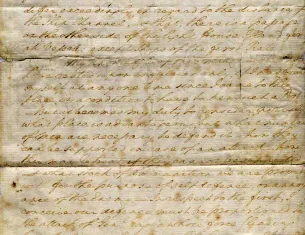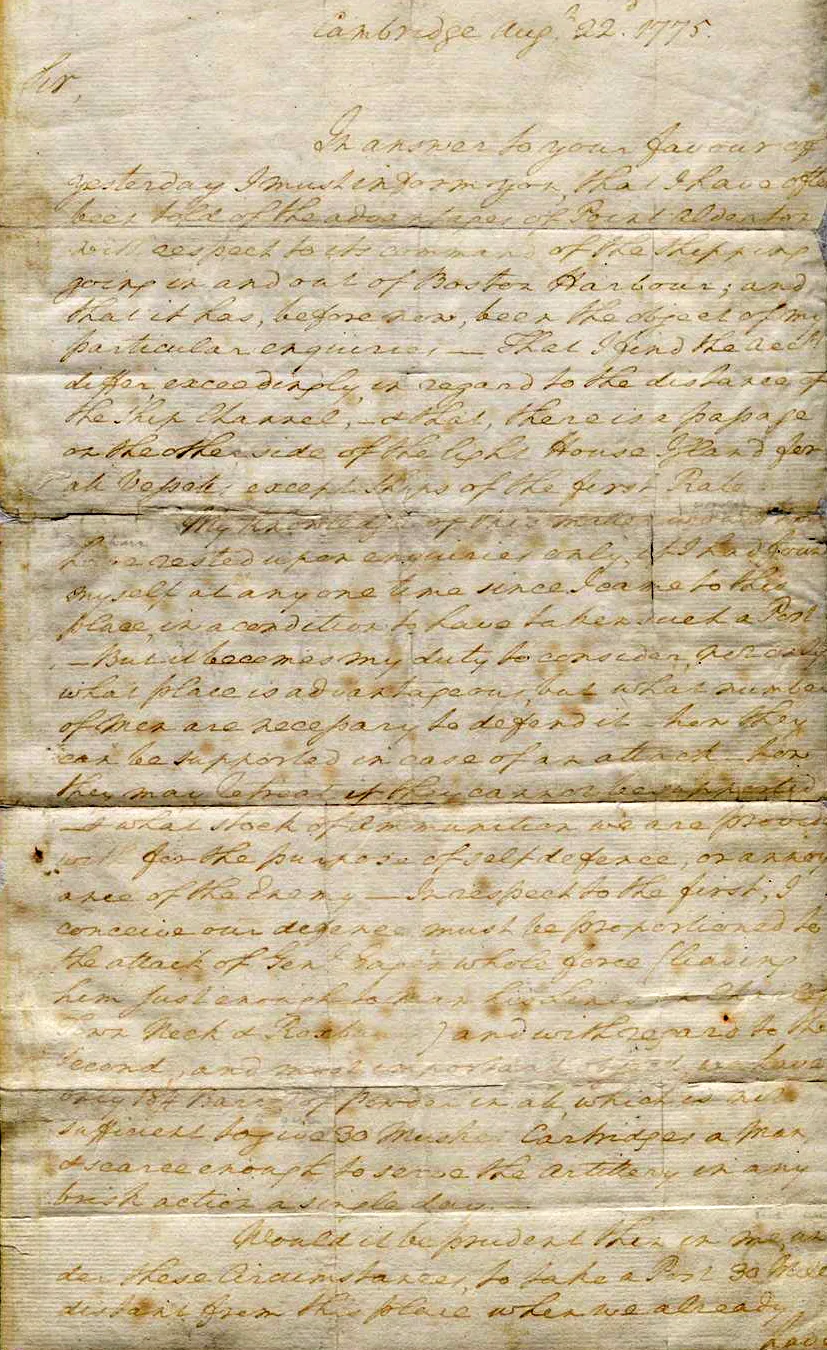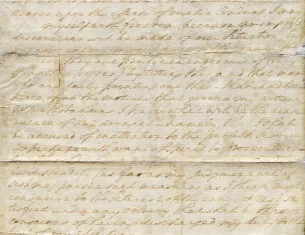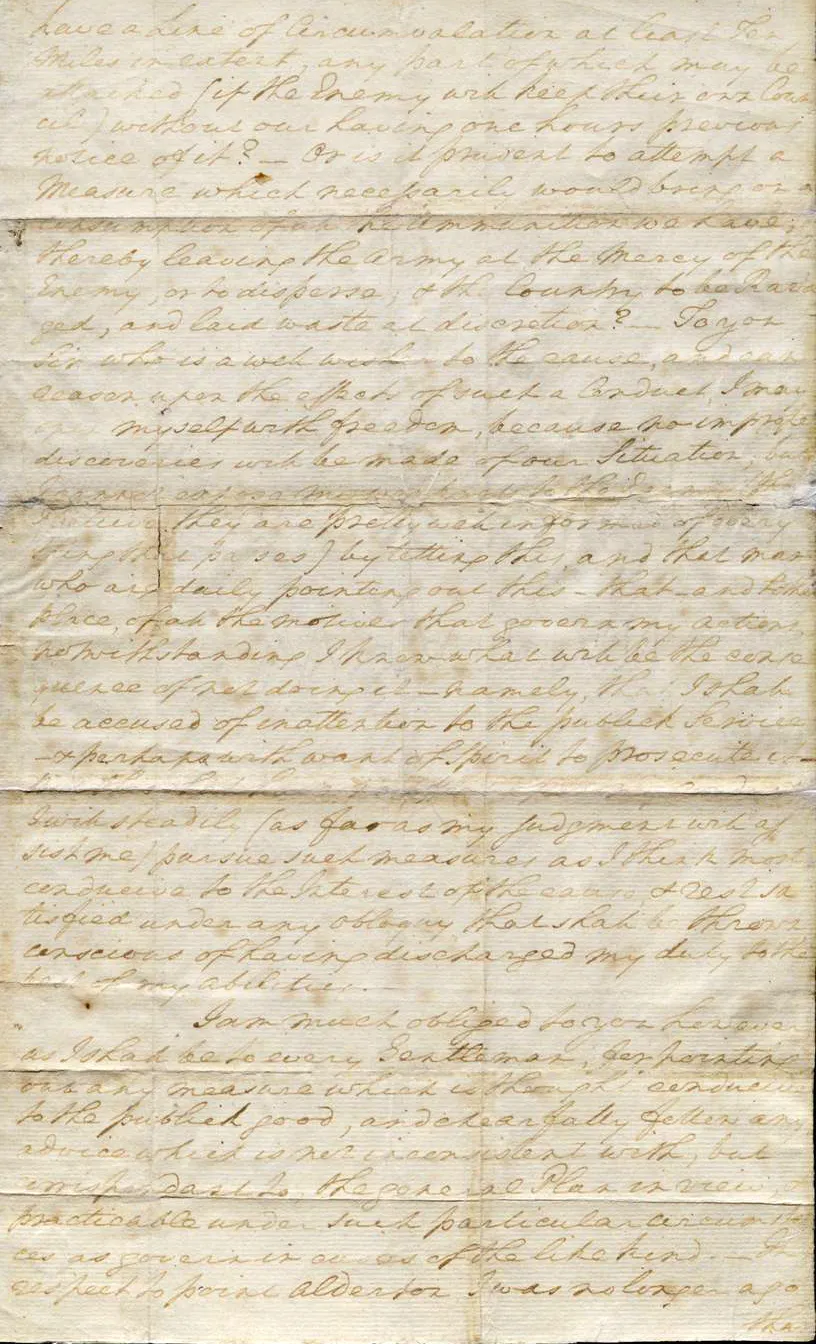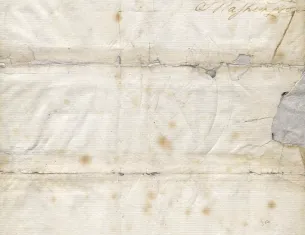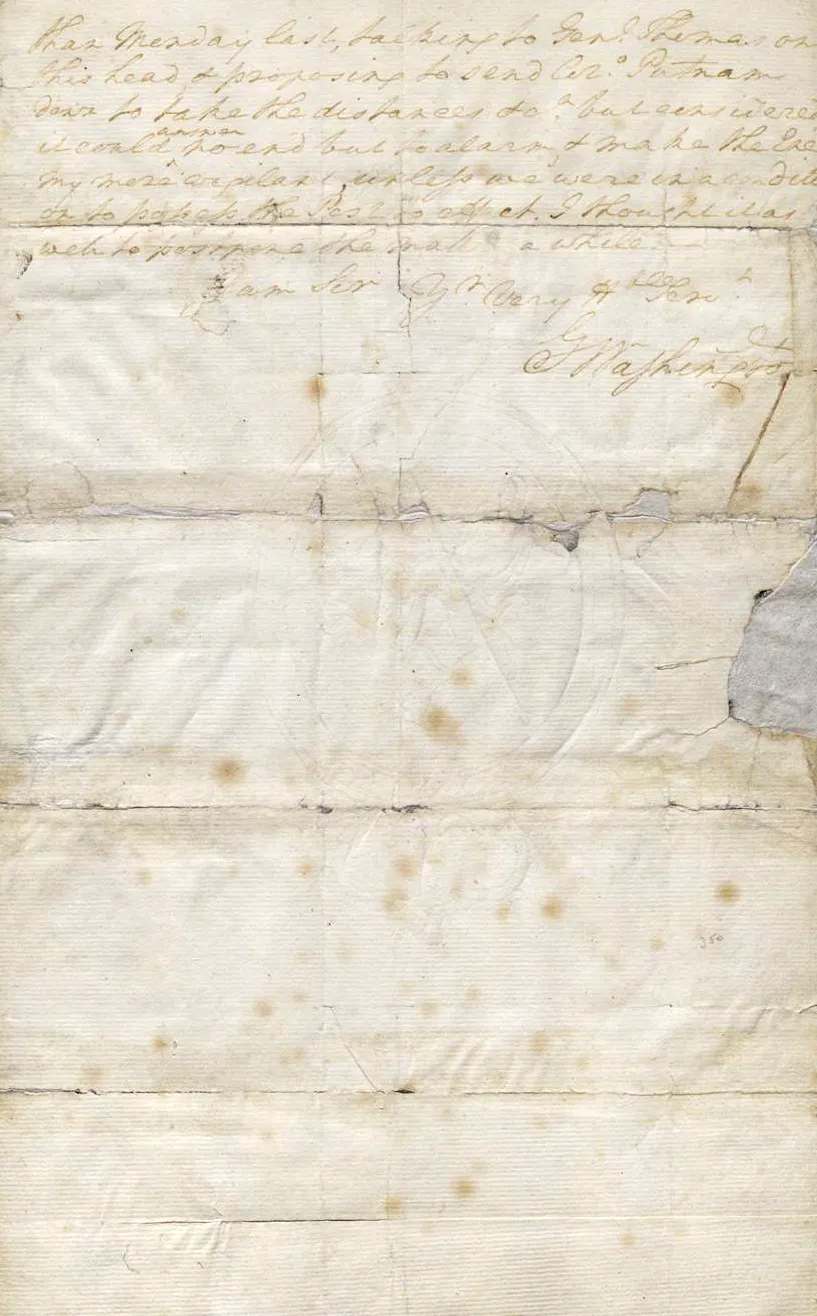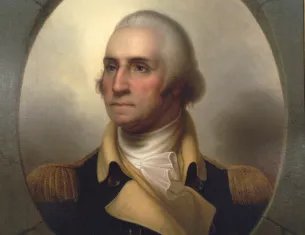George Washington on Military Strategy near Boston, 1775
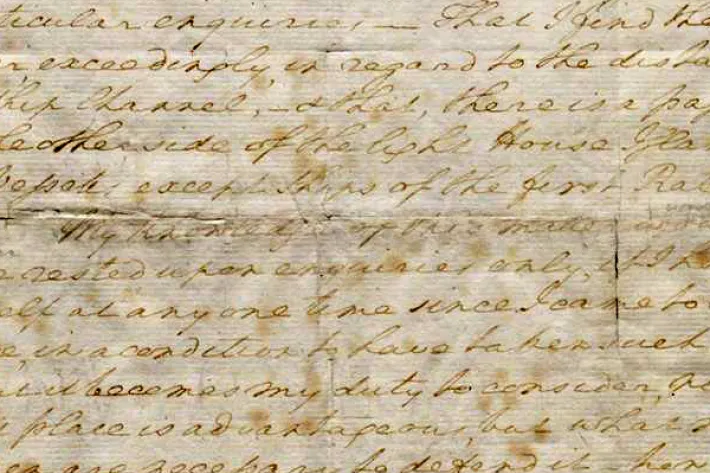
George Washington to Joseph Palmer, August 22, 1775 (The Gilder Lehrman Institute of American History)
George Washington was named commander in chief of the Continental forces in June 1775 and immediately headed for Boston, where American militia had pinned the British down in Charlestown. Familiar with fighting on the frontier, Washington had to learn new strategies for the siege of Boston. In this letter, written on August 22, 1775, he asks Joseph Palmer, a local businessman and militia officer, for information on the surrounding area and the best options for defeating the British.
A Letter from George Washington to Joseph Palmer, August 22, 1775
Cambridge Aug 22 1775
Sir,
In answer to your favour of yesterday I must inform you, that I have often been told of the advantages of Point Alderton with respect to its command of the shipping going in and out of Boston Harbour; and that it has, before now, been the object of my particular enquiries – That I find the accts differ exceedingly, in regard to the distance of the ship Channel, – & that, there is a passage on the other side of the light House Island for all Vessels except Ships of the first Rate.
My knowledge of this matter would not have rested upon enquiries only, if I had found myself at any one time since I came to this place, in a condition to have taken such a Post – But it becomes my duty to consider, not only what place is advantageous, but what number of men are necessary to defend it – how they can be supported in case of an attack-- how they may Retreat if they cannot be supported – & what stock of ammunition we are provided with for the purpose of self defence, or annoyance of the Enemy – In respect to the first, I conceive our defence must be proportioned to the attack of Genl Gape’s whole force (leaving him just enough to man his Lines on Charles Town Neck & Roxbury) and with regard to the second, and most important object, we have only 184 Barrls of powder in all, which is not sufficient to give 30 Musket Cartridges a man, & scarce enough to serve the artillery in any brisk action a single day.
Would it be prudent then in me, under these Circumstances, to take a Post 30 Miles distant from this place when we already have a Line of Circumvalation at least Ten Miles in extent, any part of which may be attacked (if the Enemy will keep their own Council) without our having one hours previous notice of it? – Or is it prudent to attempt a Measure which necessarily would bring on a cunsumption of all the ammunition we have; thereby leaving the army at the Mercy of the Enemy, or to disperse; & the Country to be Ravaged, and laid waste at discretion? –
To you Sir who is a well wisher to the cause, and can reason upon the effects of such a Conduct, I may open myself with freedom, because no improper discoveries will be made of our Situation; but I cannot expose my weakness to the Enemies (that I believe they are pretty well informed of everything that passes) by telling this, and that man who are daily pointing out this – that – and to the place, of all the motives that govern my actions, notwithstanding I know what will be the consequence of not doing it – namely, that I shall be accused of inattention to the publick Service – & perhaps with want of Spirit to prosecute it – But this shall have no affect upon my conduct I wish steadily (as far as my judgment will assist me) pursue such measures as I think most conducive to the Interest of the cause, & rest satisfied under any obliging that shall be thrown conscious of having discharged my duty to the best of my abilities.
I am much obliged to you however as I shall be to every Gentleman, for pointing out any measure which is thought conducive to the publick good, and chearfully follow any advice which is not inconsistent with, but corrispondant to, the general Plan in view, & practicable under such particular circumstances as govern in cases of the like kind. – In respect to point alderton, I was no longer ago than Monday last, talking to Genl. Thomas on this head & proposing to send Colo Putnam down to take the distances &ca but considered it could answer no end but to alarm, & make the Enemy more vigilant,unless we were in a condition to possess the Post to effect. I thought it as well to postpone the matter a while. –
I am Sir Yr Very Hble Servt
GWashington
Source: George Washington to Joseph Palmer, August 22, 1775, The Gilder Lehrman Institute of American History, GLC04858.
A Letter from George Washington to Joseph Palmer, August 22, 1775
Cambridge Aug 22 1775
Sir,
In answer to your favour of yesterday I must inform you, that I have often been told of the advantages of Point Alderton with respect to its command of the shipping going in and out of Boston Harbour; and that it has, before now, been the object of my particular enquiries – That I find the accts differ exceedingly, in regard to the distance of the ship Channel, – & that, there is a passage on the other side of the light House Island for all Vessels except Ships of the first Rate.
My knowledge of this matter would not have rested upon enquiries only, if I had found myself at any one time since I came to this place, in a condition to have taken such a Post – But it becomes my duty to consider, not only what place is advantageous, but what number of men are necessary to defend it – how they can be supported in case of an attack-- how they may Retreat if they cannot be supported – & what stock of ammunition we are provided with for the purpose of self defence, or annoyance of the Enemy . . .
To you Sir who is a well wisher to the cause, and can reason upon the effects of such a Conduct, I may open myself with freedom, because no improper discoveries will be made of our Situation . . .
I am much obliged to you however as I shall be to every Gentleman, for pointing out any measure which is thought conducive to the publick good, and chearfully follow any advice which is not inconsistent with, but corrispondant to, the general Plan in view, & practicable under such particular circumstances as govern in cases of the like kind . . .
I am Sir Yr Very Hble Servt
GWashington
Source: George Washington to Joseph Palmer, August 22, 1775, The Gilder Lehrman Institute of American History, GLC04858.
Background
George Washington was named commander in chief of the Continental forces in June 1775 and immediately headed for Boston, where American militia had pinned the British down in Charlestown. Familiar with fighting on the frontier, Washington had to learn new strategies for the siege of Boston. In this letter, written on August 22, 1775, he asks Joseph Palmer, a local businessman and militia officer, for information on the surrounding area and the best options for defeating the British.
Transcript
A Letter from George Washington to Joseph Palmer, August 22, 1775
Cambridge Aug 22 1775
Sir,
In answer to your favour of yesterday I must inform you, that I have often been told of the advantages of Point Alderton with respect to its command of the shipping going in and out of Boston Harbour; and that it has, before now, been the object of my particular enquiries – That I find the accts differ exceedingly, in regard to the distance of the ship Channel, – & that, there is a passage on the other side of the light House Island for all Vessels except Ships of the first Rate.
My knowledge of this matter would not have rested upon enquiries only, if I had found myself at any one time since I came to this place, in a condition to have taken such a Post – But it becomes my duty to consider, not only what place is advantageous, but what number of men are necessary to defend it – how they can be supported in case of an attack-- how they may Retreat if they cannot be supported – & what stock of ammunition we are provided with for the purpose of self defence, or annoyance of the Enemy – In respect to the first, I conceive our defence must be proportioned to the attack of Genl Gape’s whole force (leaving him just enough to man his Lines on Charles Town Neck & Roxbury) and with regard to the second, and most important object, we have only 184 Barrls of powder in all, which is not sufficient to give 30 Musket Cartridges a man, & scarce enough to serve the artillery in any brisk action a single day.
Would it be prudent then in me, under these Circumstances, to take a Post 30 Miles distant from this place when we already have a Line of Circumvalation at least Ten Miles in extent, any part of which may be attacked (if the Enemy will keep their own Council) without our having one hours previous notice of it? – Or is it prudent to attempt a Measure which necessarily would bring on a cunsumption of all the ammunition we have; thereby leaving the army at the Mercy of the Enemy, or to disperse; & the Country to be Ravaged, and laid waste at discretion? –
To you Sir who is a well wisher to the cause, and can reason upon the effects of such a Conduct, I may open myself with freedom, because no improper discoveries will be made of our Situation; but I cannot expose my weakness to the Enemies (that I believe they are pretty well informed of everything that passes) by telling this, and that man who are daily pointing out this – that – and to the place, of all the motives that govern my actions, notwithstanding I know what will be the consequence of not doing it – namely, that I shall be accused of inattention to the publick Service – & perhaps with want of Spirit to prosecute it – But this shall have no affect upon my conduct I wish steadily (as far as my judgment will assist me) pursue such measures as I think most conducive to the Interest of the cause, & rest satisfied under any obliging that shall be thrown conscious of having discharged my duty to the best of my abilities.
I am much obliged to you however as I shall be to every Gentleman, for pointing out any measure which is thought conducive to the publick good, and chearfully follow any advice which is not inconsistent with, but corrispondant to, the general Plan in view, & practicable under such particular circumstances as govern in cases of the like kind. – In respect to point alderton, I was no longer ago than Monday last, talking to Genl. Thomas on this head & proposing to send Colo Putnam down to take the distances &ca but considered it could answer no end but to alarm, & make the Enemy more vigilant,unless we were in a condition to possess the Post to effect. I thought it as well to postpone the matter a while. –
I am Sir Yr Very Hble Servt
GWashington
Source: George Washington to Joseph Palmer, August 22, 1775, The Gilder Lehrman Institute of American History, GLC04858.
Excerpt
A Letter from George Washington to Joseph Palmer, August 22, 1775
Cambridge Aug 22 1775
Sir,
In answer to your favour of yesterday I must inform you, that I have often been told of the advantages of Point Alderton with respect to its command of the shipping going in and out of Boston Harbour; and that it has, before now, been the object of my particular enquiries – That I find the accts differ exceedingly, in regard to the distance of the ship Channel, – & that, there is a passage on the other side of the light House Island for all Vessels except Ships of the first Rate.
My knowledge of this matter would not have rested upon enquiries only, if I had found myself at any one time since I came to this place, in a condition to have taken such a Post – But it becomes my duty to consider, not only what place is advantageous, but what number of men are necessary to defend it – how they can be supported in case of an attack-- how they may Retreat if they cannot be supported – & what stock of ammunition we are provided with for the purpose of self defence, or annoyance of the Enemy . . .
To you Sir who is a well wisher to the cause, and can reason upon the effects of such a Conduct, I may open myself with freedom, because no improper discoveries will be made of our Situation . . .
I am much obliged to you however as I shall be to every Gentleman, for pointing out any measure which is thought conducive to the publick good, and chearfully follow any advice which is not inconsistent with, but corrispondant to, the general Plan in view, & practicable under such particular circumstances as govern in cases of the like kind . . .
I am Sir Yr Very Hble Servt
GWashington
Source: George Washington to Joseph Palmer, August 22, 1775, The Gilder Lehrman Institute of American History, GLC04858.
